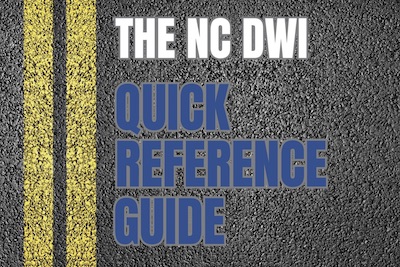Violation of Protective Order – Notice and Intent Required
 Violation of a domestic violence protective order in North Carolina is a serious criminal charge.
Violation of a domestic violence protective order in North Carolina is a serious criminal charge.
Indeed, it is classified as a class A1 misdemeanor, subjecting the accused to a maximum period of incarceration of 150 days in jail.
The facts and circumstances behind a 50B violation may also serve as a predicate offense for more serious felony charges including felony breaking and entering and/or felony weapons offenses.
Notice of Protective OrderProtective orders in North Carolina are commonly obtained through a civil court proceeding.
That may be accomplished citing Chapter 50B, Chapter 50C, or some other legal basis under the NC laws including but not limited to Chapter 50 divorce and separation matters.
Sometimes referred to as a restraining order, they often seek to protect the plaintiff or “petitioner” from actions of domestic violence, future assaults or battery, threats, mental anguish, and harassment.
Ordinarily, violating a court order would result in contempt of court proceedings.
In North Carolina, willfully violating a domestic violence restraining order or “50B protective order” is a separate criminal offense.
Whether for a contempt proceeding or new criminal charge, notice of the existence of a valid protective order is required.
Put simply, the defendant respondent must be properly served and made aware of the Court's Order precluding certain types of contact with the petitioner.
Part of the process includes the opportunity to be heard, although with regard to a 50B in NC, the petitioner is authorized to seek relief from the court ex parte.
In the event the respondent to a petition for a restraining order is not properly served, there may be defenses available to the accused for alleged violations of that Order.
When involving allegations of acts of domestic violence and the initial filing of a “Motion and Order for Domestic Violence Protective Order,” or “DVPD,” the Court is required to hear the matter within 10 days of the petition and entry of the initial, protective order.
At the “10-day hearing” the Court makes a determination as to whether the defendant was served with the petition and temporary Order prior to moving forward.
The respondent must also be provided notice of the location, date, and time of all hearings and trials.
The Court is authorized to continue the matter in order for service of the protective order to be effectuated, although that may be for a limited period of time.
In the event service a process is not completed, the Court may dismiss the matter “with leave,” authorizing later refiling without prejudice as these circumstances require.
Specific Intent Felony or misdemeanor criminal charges in North Carolina, relative to Orders, require the accused to willfully, intentionally, and unlawfully, violate a protective order.
Felony or misdemeanor criminal charges in North Carolina, relative to Orders, require the accused to willfully, intentionally, and unlawfully, violate a protective order.
As such, intent is an essential element of the offense.
Proving a violation necessarily includes evidence the accused was aware of the existence of the judge's Order.
That knowledge may be proven by way of something known as circumstantial evidence, including reasonable inferences drawn from the fact-pattern.
Motions to dismiss are taken in the light most favorable to the non-moving party, which in criminal charges would be the State of North Carolina as represented by the assistant District Attorney.
In order to obtain a conviction, the State must prove beyond a reasonable doubt that the defendant had knowledge of the DVPO. That may be proven in fact or constructively through circumstantial evidence.
Proof may not be “tenuous” or speculative in nature, either with regard to a Motion to Dismiss or proof sufficient to submit the criminal charges to a jury for a determination of guilt or innocence.
Therefore, in the event the state cannot prove the defendant knew or reasonably should have known there was a domestic violence restraining order pending against him or her, felony charges related to use of a weapon in violation of that same protective order would likely be impossible to prove.
The state of North Carolina carries the burden of proof for all criminal charges in North Carolina.
The defendant has no burden of proof or production.
There is a technical distinction between a motion to dismiss at the close of states evidence and proof beyond a reasonable doubt.
As set forth in North Carolina vs Tucker (State v. Tucker No. COA19-715) a Mecklenburg County case, the North Carolina Court of Appeals recently upheld this principle in its Aug 18, 2020. The court's failure to dismiss the matter for lack of evidence at the close of states evidence was found to be reversible error.
Charlotte Criminal Defense LawyersIf you have a criminal matter in Mecklenburg County or Charlotte Criminal Court, we encourage you to immediately seek legal counsel.
Exercise your Right to Remain Silent. Do not answer questions or participate in an investigation.
Ask law enforcement officers if you are under arrest and “may I please leave now.”
The lawyers at the Powers Law Firm PA are available for legal consultation.
We do not charge consultation fees for criminal charges.
Call now 704-342-4357 and ask to speak to Bill Powers.
You may also reach bill at his email address: Bill@CarolinaAttorneys.com
Helpful Information About Criminal Charges Powers Law Firm PA Home
Powers Law Firm PA Home



















